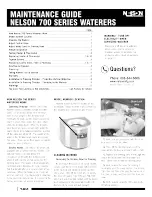
Section 3: Operation
020-100001-01 Rev. 01 (04/07)
3-27
.
NOTE:
When certain RGB signals are first connected, the projector may not initially
recognize them as RGB and will incorrectly decode their color information as YPbPr
(video). These signals can include:
•
RGB signals in NTSC, PAL, SECAM frequency ranges.
•
Scan-doubled sync-on-green.
•
Scan-quadrupled sync-on-green.
For these signals, change the Color Space to RGB, and then define a new channel for
future use.
Video Options
— SUBMENU
This submenu is used with video
sources only (
INPUTS
3
or
4
).
ENABLE DECODER AGC:
Automatic Gain Control (AGC) affects decoded video
images only. Enter a checkmark (default) in most instances—this activates the
decoder’s AGC circuit to ensure properly bright images. Delete the checkmark if a
decoded video image exhibits strange color artifacts such as stripes in highly saturated
colors, indicating an incompatibility between this source and the AGC.
VIDEO STANDARD:
For all but the more unusual video
standards available in the world, the projector automatically
detects the incoming horizontal and vertical frequencies and
sets the projector’s processing of this signal to the
corresponding standard. The current video standard name
appears in the
Video Options
submenu, and includes an “A” if
it has been auto-detected. Press
to view or select a
different video standard from those available to the
projector—any that are disabled have frequency
characteristics that differ from those of the incoming signal. Selecting a specific
standard forces the projector to process the signal according to this standard.
NOTE:
Best results are obtained with defined channels. Otherwise, switching from
one video source to another can sometimes cause slight disturbances in the display,
indicating that the Auto function is struggling. Recover by briefly selecting a different
video standard, then going back
.
Table 3.3. Regions and Video Standards: Summary
Standard Where Used
(SUBJECT-TO-CHANGE
)
NTSC N. America and Japan
NTSC 4.43 A tape-only standard for partially-translated hybrid signals
PAL Most of Europe, China, Australia, some of S. America, some of Africa
PAL-M Brazil
PAL-NC Argentina, Chile, other Latin American countries
PAL 60
SECAM France, Eastern Europe, most of Africa
Summary of Contents for DW6Kc
Page 1: ...U s e r s M a n u a l U s e r s M a n u a l 020 100001 01 ...
Page 3: ......
Page 5: ......
Page 9: ......
Page 103: ......
Page 119: ......
Page 127: ......
Page 135: ......
Page 137: ......
Page 139: ......
Page 141: ...Appendix D Throw Distance D 2 020 100001 01 Rev 01 04 07 SXGA Lenses f ...
Page 142: ...Appendix D Throw Distance 020 100001 01 Rev 01 04 07 D 3 ...
Page 143: ...Appendix D Throw Distance D 4 020 100001 01 Rev 01 04 07 ...
Page 144: ...Appendix D Throw Distance 020 100001 01 Rev 01 04 07 D 5 ...
Page 145: ...Appendix D Throw Distance D 6 020 100001 01 Rev 01 04 07 ...
Page 146: ...Appendix D Throw Distance 020 100001 01 Rev 01 04 07 D 7 ...
Page 147: ...Appendix D Throw Distance D 8 020 100001 01 Rev 01 04 07 ...
Page 148: ...Appendix D Throw Distance 020 100001 01 Rev 01 04 07 D 9 ...
Page 149: ...Appendix D Throw Distance D 10 020 100001 01 Rev 01 04 07 ...
Page 173: ......
















































